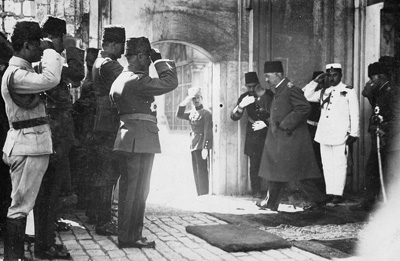
With the defeat of the culturally backward Ottoman state in the First World War Arabic Islamic societies began their difficult, fitful attempts at awakening and resurgence. The First World War represents the end of the chronological tunnel of regression. But the phase that followed it, and which is still active, is a phase of ‘post-backwardness.’
HUMAN THOUGHT constitutes the basis upon which a society is built, whether the society be primitive and enveloped in totemistic thinking or at the pinnacle of a culture where scientific thought plays a pioneering role in its construction and direction. Similarly it is difficult to make a distinction between thought and society as an agent of it, since both parties mutually influence, and are influenced by, each other.
From the mediaeval period to the present day Europe passed through various intellectual and social phases. These phases collectively formed the basis of the current social and intellectual situation and provided the basis for the dynamic of social development. Some of the most important phases whose echoes we still hear today are those which are termed the Age of Enlightenment (1650-1700) the Industrial Revolution (1750-1850) and the humanitarian movements. The Age of Enlightenment in Europe began around the 18th century when philosophy of rationalism initiated its role in motivating society and providing the impulse towards the strengthening of science.
The beginning of this rationalist tendency in the 17th century was represented by Baruch Spinoza, John Locke, Voltaire and others. Baruch Spinoza was a rationalist Jewish thinker who faced much rejection and difficulties from Jewish hardliners but his thoughts found their echoes in the Age of Enlightenment. This intellectual resurgence rested upon raising the prestige of rationalist thought and free debate without red lines. The Age of Enlightenment followed an age of intellectual suppression (the age of the Inquisition courts) and was subsequently followed by the Industrial Revolution and humanitarian movements.
Islamic thought confirmed that no knowledge existed outside the realm of religious thought
The enthronement of rationalism led to both industrial and social development. These in turn led to the great humanitarian movements of the 18th century, which in turn led to the abrogation of torture, slavery, sexual and racial discrimination. The humanitarian movements emerged among small activists reformist groupings that succeeded in pushing European societies in the direction of humanitarian movements. Scientific academies played a role, following their own development, in participating in society. The 13th century is distinguished for its being the century where universities flourished,[1] when the universities of Paris (France), Oxford (England), Cambridge (England), Padua (Italy) and Naples (Italy) were founded and when, in the same century, the Mustansiriyya school was founded in Baghdad.
The Western universities went on developing and continue to bear a culture that constantly strengthens human knowledge with their manifold achievements, while the Mustansiriyya was fated not to develop. When the Iraqi state was founded in 1921 this university was nothing but ruins and debris and was being used as a storehouse. The Mustansiriyya was originally a school that specialised in religious sciences and remained so until it gradually became extinct. Whereas we find that the western universities, which had begun in much the same way, developed on to embrace all fields of knowledge and science.
The reason for this stagnation, somnolence and eventual extinction has to do with society’s conception of knowledge as crystallised by Islamic thought, one which confirmed that no knowledge existed outside the realm of religious thought.[2] From the above summary we can see that Western social development took a progressive, accumulative direction powered by active forces, whether intellectual or social, and passed through natural stages of development. There is no doubt that fast-paced technological development left its intellectual mark, and still does, on intellectual and artistic creativity in the developed societies. That is why, at the same rate as the technological achievements, there appeared modes of thought and systems seeking to accommodate modern life. Western societies depend on precise, interlinked systems to construct their way of life. These systems have roots that go back several centuries, yet these roots have never at any time interrupted the process of modernity or development.
The West also attempts to study everything not simply for the sake of study but also in order to derive benefit from it. The West made philosophical studies of its swift cultural development and as a result the term ‘modernity’ came into being, a term which went on to enter into modern philosophical vocabularies. Theorists of modernity are divided as to when this phase of modernity began but what is beyond doubt is that the Age of Enlightenment, the Industrial Revolution and the humanitarian movements played a basic role in confronting the challenges, and led to the establishment of new data in the various political, artistic and scientific aspects of life. Thus some of the philosophies of modernity go back to the 15th century,[3] while some trace their beginnings to the Age of Enlightenment. Due to the rapidity of this development some see modernity as having passed through three periods,[4] while some see that these western societies have since the second half of the 20th century entered into a phase of post-modernity.
We have previously explained[5] that Arab, Islamic societies have been passing through an unnatural phase of cultural backwardness ever since the 11th or 12th centuries AD, up until the fall of the Ottoman state. With the defeat of the culturally backward Ottoman state in the First World War Arabic and Islamic societies began their difficult, fitful attempts at awakening and resurgence. In addition, these societies were as yet unfamiliar with the rationalist mode of thinking that had been stamped out along with the Muʽtazila, and which had been the basis of the western Age of Enlightenment. At a time when Western societies were living through grievous conflicts on the path of continuous modernisation, Arab Islamic societies remained culturally lethargic. There was thus no modernity in existence in these societies, rather there was an alarming level of backwardness which increased with the passing of time relative to the developed societies.
After the First World War, and with the beginning of cultural mingling with the rest of the world, backwardness began to recede. In this sense the First World War represents the end of the chronological tunnel of regression. But the phase that followed it, and which is still active, is a phase of ‘post-backwardness.’
The regression was therefore halted with the beginning of the 20th century, yet it is still active. Roots that go back several centuries cannot be extracted in a couple of years or even decades. The ‘post-backwardness’ phase is a phase of searching for a path and an identity. It is clearly a troubled phase but its main problem is that the basic cause of backwardness remains in existence, albeit far from constituting a subject of interest. The prevailing mentality, which is hemmed in by many red lines, severely narrows the space for intellectual freedom. Intellectual movements are therefore well-nigh impossible and consequently all the dithering attempts at awakening and resurgence have ended in failure.

Suggested Reading
We should specify here four important detours in the history of Arab, Islamic societal development from the basis of intellectual creativity:
- the emergence of the Islamic nation state, and the emergence of distinguished intellectual creativity with the beginning of the appearance of the intellectual phase in Islamic thought. This period lasted almost four centuries.
- The end of intellectual freedom and the suppression of scientific creativity around the 11th century. This lead to intellectual stagnation, societal lethargy and isolation from human culture. This period lasted almost nine centuries.[6]
- The First World War. The war brought about many political changes, including the end of the Ottoman state which ruled over most of the Arab and Islamic world. The First World War constitutes the beginning of the end of society’s isolation from human culture at the beginning of the 20th century.
- Over the 20th century phases of society’s fumbling attempts at awakening and resurgence made their appearance along with independent nation states and the search for identity. This phase is the ‘post-backwardness’ phase and constitutes the most important period in the history of this societies. The ‘post-backwardness’ phase is still in its early stages and has yet to get beyond the stage of unconscious fumblings. The most conspicuous feature of this phase is the culture shock at the level of society. This culture shock has a personal stamp and results from the intermingling of the individual in new and different societies and it is a state which is recognised in psychology and sociology.[7] Culture shock at the level of society results from the intermingling of an isolated society with other societies, and is a somewhat rare phenomenon.
[1] M. I. Sanduk, Growth of science under the social influence in Arabic-Islamic and Western Civilisations, 700-1900 (Statistical Models) http://philsci-archive.pitt.edu/9012/.
[2] An example of this thinking can be seen in the work by Nāsir bin Hamad al-Fahd, حقيقة الحضارة الاسلامية (‘The Truth of Islamic Culture’) http://www.tawhed.ws/r?i=008j8m2r .
[3] Toulmin, Stephen Edelston. 1990. Cosmopolis: The Hidden Agenda of Modernity. New York: Free Press. Paperback reprint 1992, Chicago: Univers
ity of Chicago Press.
[4] Berman, Marshall. 1982. All That Is Solid Melts into Air: The Experience of Modernity. New York: Simon and Schuster.
[5] See M. Sanduk, Freedom and the Progress of Civilization , Almuslih.
[6] M. I. Sanduk, Growth of science.
[7] Oberg, Dr. Lalervo, “Culture Shock and the Problem of Adjustment to the New Cultural Environments”. World Wide Classroom Consortium for International Education & Multicultural Studies. 29 Sept 2009.



